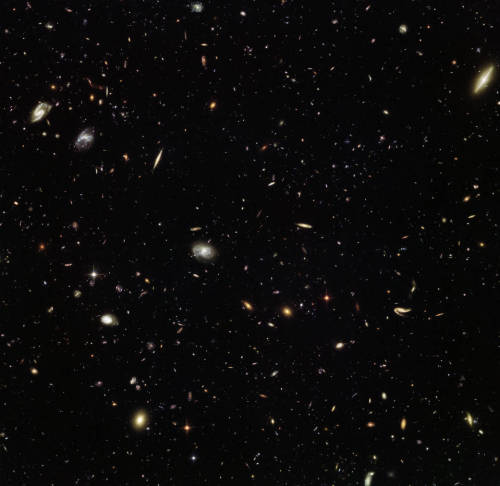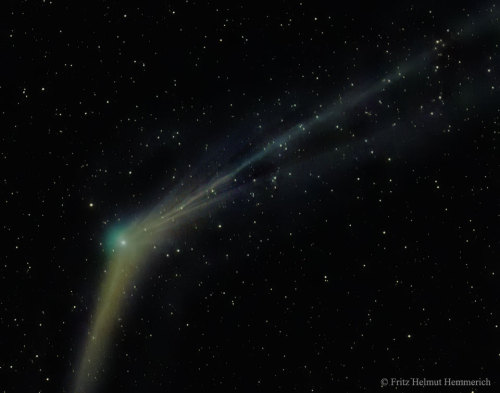Charon And Pluto: Strikingly Different Worlds

Charon and Pluto: Strikingly Different Worlds
js
More Posts from Littlecadet-biguniverse and Others

Hubble peers billions of light years away, uncovering thousands of colorful galaxies clustered together in the constellation of Leo (The Lion). Galaxy clusters are so massive that their immense gravity warps and amplifies the light from more distant objects. This phenomenon, known as gravitational lensing, can help astronomers reveal the earliest galaxies in our universe.

Valles Marineris. “Grand Canyon” of Mars.
Image Credit: Viking Project, USGS, NASA


The Department of Awesome Natural Phenomena has features amazing auroras before, but never an aurora on another planet! This extraordinary sight, brought to us by the NASA/ESA Hubble Space Telescope, is an incredibly colossal aurora taking place on Jupiter:
“At the gas giant’s north pole, the most powerful and luminous northern lights in the solar system shimmer and glow in an endless geomagnetic storm that’s larger than our entire planet.”
That’s right, Jupiter itself is already so awesomely huge that its auroras are larger than the planet Earth.
Watch this time-lapse video of the Jupiter auroras and then visit the Hubble website to learn more about this amazing phenomena.
[via Twisted Sifter and Gizmodo]

Night Sky Over Mt. Fuji - Jan. 2016
js


Comet Catalina Emerges : Comet Catalina is ready for its close-up. The giant snowball from the outer Solar System, known formally as C/2013 US10 tails, making it an impressive object for binoculars and long-exposure cameras. The featured image was taken last week from the Canary Islands, off the northwest coast of Africa. Sky enthusiasts around the world will surely be tracking the comet over the next few months to see how it evolves. via NASA
js

NGC 1275 Multi-Wavelength

Into the storm

NGC 3576, an emission nebula in the constellation of Carina 6,000 light years away. -image via paulhaese.net
Solar System: Things to Know This Week
Our solar system is huge, so let us break it down for you. Here are a few things to know this week:
1. We’re Going In

To be honest, Jupiter is kind of a monster. Not only is it the biggest planet in the solar system, but it also wields the most dangerous radiation and other powerful forces. Despite the risks, our Juno probe is going in close, because Jupiter also holds precious clues to how the planets formed, including our own. Arrival date: July 4. Watch the Juno mission trailer video HERE.
2. Moon Maps

The moon is beautiful in the sky, and also up close—sometimes even in the maps that scientists use to study its surface. Here are some evocative maps that lunar geologists have drawn up to chart the landscapes in the moon’s dramatic Tycho Crater. Take a look HERE.
3. That’s No Moon…Sort Of

The full moon we’ll see this week is not Earth’s only companion in space. Astronomers have discovered a small asteroid in an orbit around the sun that keeps it near the Earth, where it will remain for centuries. But it’s not exactly a second moon, either.
4. Power Blast

Venus has an “electric wind” strong enough to remove the components of water from its upper atmosphere, which may have played a significant role in stripping Earth’s twin planet of its oceans, according to new results from the European Space Agency (ESA) Venus Express mission by NASA-funded researchers.
5. How Green (Well, Red) Was My Valley

“Marathon Valley” slices through the rim of a large crater on Mars. It has provided fruitful research targets for our Opportunity rover since July 2015, but now the rover’s team is preparing to move on.
Want to learn more? Read our full list of the 10 things to know this week about the solar system HERE.
Make sure to follow us on Tumblr for your regular dose of space: http://nasa.tumblr.com
-
 magnetos-archive reblogged this · 2 years ago
magnetos-archive reblogged this · 2 years ago -
 cataradical reblogged this · 2 years ago
cataradical reblogged this · 2 years ago -
 kiss-me-sober liked this · 3 years ago
kiss-me-sober liked this · 3 years ago -
 jolifuton liked this · 5 years ago
jolifuton liked this · 5 years ago -
 schlafertrunken reblogged this · 5 years ago
schlafertrunken reblogged this · 5 years ago -
 73776 liked this · 6 years ago
73776 liked this · 6 years ago -
 calminggel liked this · 6 years ago
calminggel liked this · 6 years ago -
 landofmazesandinsight liked this · 6 years ago
landofmazesandinsight liked this · 6 years ago -
 a-lizard-in-disguise liked this · 6 years ago
a-lizard-in-disguise liked this · 6 years ago -
 tomatescerejas reblogged this · 6 years ago
tomatescerejas reblogged this · 6 years ago -
 tomatescerejas liked this · 6 years ago
tomatescerejas liked this · 6 years ago -
 expansion-gallery reblogged this · 6 years ago
expansion-gallery reblogged this · 6 years ago -
 woopnass reblogged this · 6 years ago
woopnass reblogged this · 6 years ago -
 sharkspaceengine liked this · 6 years ago
sharkspaceengine liked this · 6 years ago -
 edy-bastos liked this · 6 years ago
edy-bastos liked this · 6 years ago -
 almostperfectwizard liked this · 6 years ago
almostperfectwizard liked this · 6 years ago -
 genocider-syo-is-still-my-queen liked this · 6 years ago
genocider-syo-is-still-my-queen liked this · 6 years ago -
 dont-see-with-ur-eyes reblogged this · 6 years ago
dont-see-with-ur-eyes reblogged this · 6 years ago -
 dont-see-with-ur-eyes liked this · 6 years ago
dont-see-with-ur-eyes liked this · 6 years ago -
 doomking reblogged this · 6 years ago
doomking reblogged this · 6 years ago -
 metyallictears reblogged this · 6 years ago
metyallictears reblogged this · 6 years ago -
 rainforest716 liked this · 6 years ago
rainforest716 liked this · 6 years ago -
 notcharmed liked this · 6 years ago
notcharmed liked this · 6 years ago -
 rickowensn reblogged this · 6 years ago
rickowensn reblogged this · 6 years ago -
 oceanuvs reblogged this · 7 years ago
oceanuvs reblogged this · 7 years ago -
 lollil liked this · 7 years ago
lollil liked this · 7 years ago -
 hobrobhabibi-blog liked this · 8 years ago
hobrobhabibi-blog liked this · 8 years ago -
 ozgenorman reblogged this · 8 years ago
ozgenorman reblogged this · 8 years ago -
 chaoselph liked this · 8 years ago
chaoselph liked this · 8 years ago -
 balljointedfairy liked this · 8 years ago
balljointedfairy liked this · 8 years ago -
 alhabor reblogged this · 8 years ago
alhabor reblogged this · 8 years ago -
 asadspaceboy-blog reblogged this · 8 years ago
asadspaceboy-blog reblogged this · 8 years ago -
 cheifintokii liked this · 8 years ago
cheifintokii liked this · 8 years ago -
 alvira-kiss liked this · 8 years ago
alvira-kiss liked this · 8 years ago -
 aperture-chell liked this · 8 years ago
aperture-chell liked this · 8 years ago -
 jjjohnnyp liked this · 8 years ago
jjjohnnyp liked this · 8 years ago
GREETINGS FROM EARTH! Welcome to my space blog! Let's explore the stars together!!!
144 posts